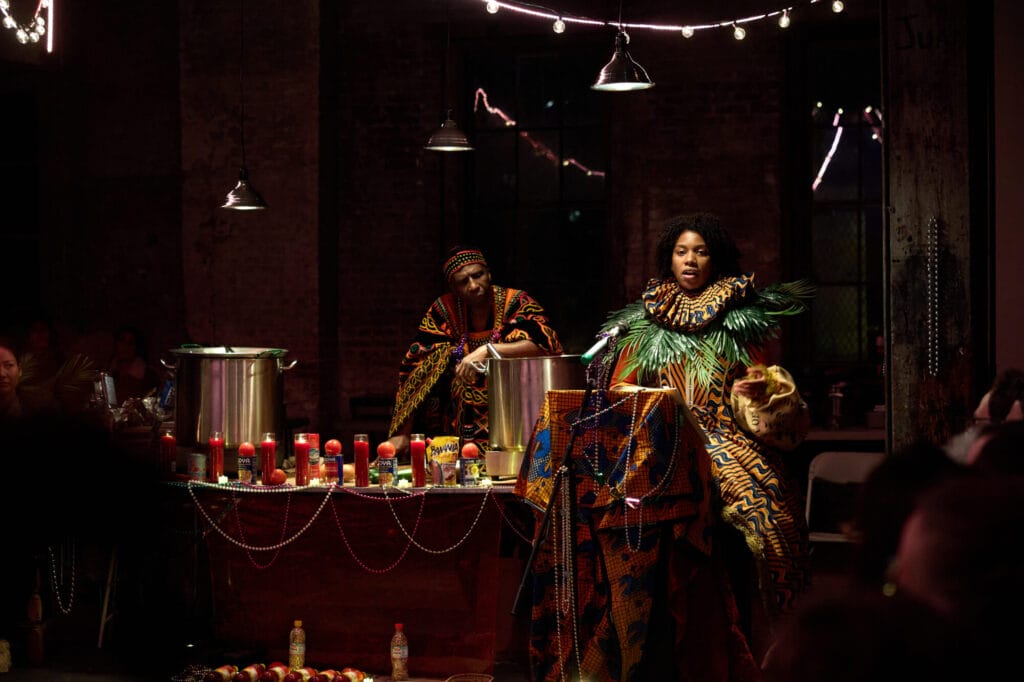Distribution :
Text : Eva Doumbia, Armand Gauz
Stage direction : Eva Doumbia
With : Alexandre Bella Ola, Bamoussa Diomande, Eva Doumbia, Olga Mouak, Angelica-Kiyomi Tisseyre
With the participation of Fargass Assandé
Assistant director and dramaturg : Karima El Kharraze
Music and vocals : Lione Elian
Choreography : Massidi Adiatou
Costumes and visuals : Sylvain Wavrant
Lighting design : Stéphane Babi Aubert
Stage manager : Loïc Jouanjan
Video : Sandrine Reisdorffer
Images Charles Ouitin, Lionel Elian
Sound Cédric Moglia
Artistic collaboration Fabien Aïssa Busetta
With the support of :
With the support of : Drac Normandie, Ville d'Elbeuf, les Grandes Tables (Friche la Belle de Mai - Marseille) - Fonds d'Insertion pour Jeunes Artistes Dramatiques, Consulat de France à la Nouvelle Orléans, LSU (Département Francophonie à Bâton Rouge, États-Unis), Ambassade de France aux États-Unis, Commission Internationale du Théâtre Francophone, FACE fondation, Théâtre de la Joliette (Marseille)
With the help of
Anis Gras-Le Lieu de l'autre (Arcueil), Fundamental Monodrama Festival (Luxembourg), Kumaso (Bamako), N'Soleh (Abidjan), Centre Social de la Savine (Marseille),
Ateliers Médicis (Clichy-Montfermeil), Beauport-Guadeloupe, la Chapelle du Verbe incarné (Avignon), Festival Papap (Port au Prince) and l'Entrepôt (Paris)
La Part du Pauvre / Nana Triban
Founded in Marseille in 2000 by director Eva Doumbia, who was supported at the time by the Théâtre des Bernardines, the Compagnie La Part du Pauvre/Nana Triban works to build a theatre that takes into account the diversity of stories from France and around the world. Since the end of 2018, the company has been based in Normandy and continues to forge links with Africa, the Caribbean and the Americas. In 2016, 2018 and 2021 she presented the Afropea Festival, supported by La Friche Belle de Mai in Marseille, MP2018 and the Africa 2020 Season. Since September 2019, La Part du Pauvre has been in residence for three years at the Théâtre des Bains Douches in Elbeuf.
Eva Doumbia
Born in Gonfreville l'Orcher, on the outskirts of Le Havre, she grew up in an environment that included union workers, immigrant workers, African students and teachers from Normandy. After studying modern literature and theatre at the University of Provence (Aix/Marseille), she trained at the Unité Nomade de Formation à la mise en scène. She is one of the co-founders of the ‘Décoloniser les Arts’ collective, which has been working since 2016 to improve the representation of minorities in culture. She is patron of the student writers at the Ecole du Nord in Lille, which is attached to the Théâtre du Nord, where she is an associate. In the early 2000s, she created performances based on her own texts, ‘Les Anges Rouges de la Ville’ and ‘Hommes, Femmes, Escargots’ in non-theatrical spaces. She has written a number of plays for the Marseilles-based children's theatre company Badaboum Théâtre, which she sometimes directs. She has also worked with authors such as Edward Bond, Alfred de Musset, Fabrice Melquiot, Kouam Tawa, Peter Turrini, Lars Noren and Bertolt Brecht. She was one of the very first to collaborate with Dieudonné Niangouna, Aristide Tarnagada and Cameroonian playwright Léonora Miano. She has adapted novels by Chester Himes, Maryse Condé, Yanick Lahens, Fabienne Kanor, Jamaica Kincaid and others. In 2015, accompanied by Raharimanan, she wrote ‘Anges Fêlées’, based on texts from her performances. This first novel was published by Vents d'Ailleurs in 2016. In 2017 she was awarded a grant from the French Institute's ‘Hors les Murs’ programme to write her text ‘Camp Philip Morris’, which takes place between Normandy and Lousiana." Le iench‘ (dog in slang), partly written in residence at the Ateliers Médicis, selected by the reading committee of the Théâtre du Rond-Point in 2017, published by Acte Sud, is a finalist for the Grand Prix de Littérature Dramatique, the Prix Franco-allemand Primeur, winner of the Prix Bernard Marie Koltès des Lycéens, and recorded at the Festival d'Avignon in 2021 by France Culture as part of the ’Voix d'Auteurs" programme. Under the title ‘Drissa’, it has been translated into German and published in the collection ‘Mé-connus’, also published by Acte Sud in 2024. ‘Autophagies’, which premiered at the Festival In d'Avignon, is currently being written into a novel, due to be published in 2024 by Éditions Project'Îles. Since 2019, in Elbeuf and in collaboration with various groups (schools and senior citizens), she has been writing the 6 annual episodes of the ‘Devoirs Surveillés’ series performed at the Théâtre des Bains Douches. Season 3 was also presented with the Festival d'Avignon as part of the cultural action programme, and season 5 will be presented in Montreuil with the CDN between October 2023 and April 2024. She has contributed to the following collective works: ‘Décolonisons les Arts’, published in 2017 by l'Arche Editeur, edited by Françoise Vergès, Gerty Dambury and Leila Cuickermann. ‘Ce qui nous arrive 1’ will be published by Éditions Espace 34 in 2020. ‘Parages 10’ (TNS review) published by Solitaires Intempestifs. ‘Pigments and the clarinet choir, Léon-Gontran Damas Jazz Poetry’ (Live-CD) in 2021 As a teacher, she runs workshops in national colleges (ERAC, Ecole de la Comédie de Saint Etienne, Ecole de Chaillot), as part of continuing education (AFDAS with La Réplique), and also with amateur audiences, as part of specific projects, such as workshops at the foot of buildings. She regularly runs training sessions in partnership with French Cultural Centres (Ouagadougou, Niamey, Bamako, Brazzaville, Libreville, Yaoundé) as well as in Brazil and Haiti.




